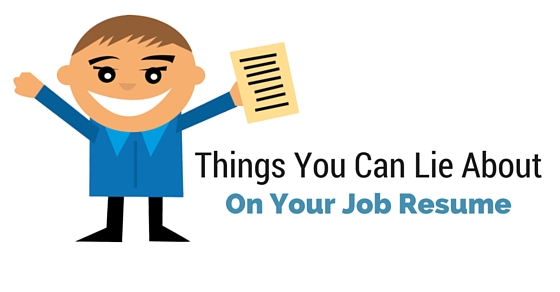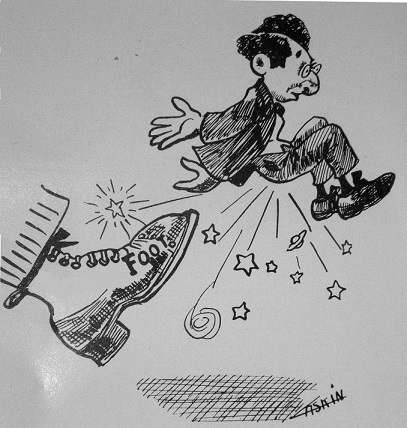A job resume is extremely crucial and you need to make sure that all the facts presented in it help to improve your job profile. At times you may have to hide certain facts or lie about certain things that may seem unpleasant in a job resume. The tactful handling of these facts can help you bag the job you most desire. Here is a list of the different facts that you can lie on resume or conceal to improve or strengthen your job profile.
 Most Effective Ways to Lie on Your Resume:
Most Effective Ways to Lie on Your Resume:
1. Hide the actual time span of your work profile:
You may have long or short working history. The work history can sometimes have certain experiences that hamper the strength of your resume. Whatever it may be, you needn’t necessary include all of your work experience. It is best not to burden your resume with irrelevant job positions that you may have held earlier. This is applicable especially with experienced candidates. They have a long work history and they may be proud of it. But editing the resume in a manner that presents all the relevant information while eliminating the insignificant is always a wise thing to do.
You must talk about skills and abilities that will add to the position you have applied for. Therefore use space in the resume to explain that is actually relevant to this job. Remember that the hiring managers do not have the time to read your entire resume. If you fill it with relevant stuff, you can be sure that it helps you get the job you have applied for.
2. Tactfully Conceal Over Qualified indicators:
You need to conceal any symptoms that tell the recruiter that you are more qualified than the job demands. If the recruiters think that you are more qualified than the job requirement , then you might be put on hold as the organization may assume that you are unaffordable while considering your remuneration. So basically, you are offering something that is not actually required in the present position.
If you want the job, it is best to hide the extra qualifications and degrees as these may act against you. You need to highlight on the abilities you possess and the reason why you wish to join the firm or organization.
3. Half Knowledge Is of No Use:
If you have limited knowledge on a certain topic, it is best not to mention it. Don’t claim to know computer knowledge even if you have little superficial knowledge. Remember that when you fake something, you should be able to master the art over the night. If you claim that you will be able to grasp a certain skill, the expectations of the employers will rise. This will later be a botheration for you as the work pressure would be more than you can handle.
So it is best not to try and get a job as a front end developer when you have limited knowledge on Java or HTML. Commit only about things that you have thorough knowledge. You should be able to give what you commit. Hence, do not reveal these facts in your resume. It is best to lie saying you have no knowledge on the subject and starting from scratch again. A lie like this helps you survive in the job longer.
4. A fresher also must speak of relevant experience:
 You may be a complete fresher in your field. If you are asked about relevant experience in the select kind of job, what would you say? You need to find useful experience not within a job but in your college life or career so far. When you sit back and think, you will know the different tasks that you have unofficially done or the different skills you have acquired. You need to speak of similar kind of work you have taken up during your college days. Try to speak of things and events that may turn relevant in your choice of career.
You may be a complete fresher in your field. If you are asked about relevant experience in the select kind of job, what would you say? You need to find useful experience not within a job but in your college life or career so far. When you sit back and think, you will know the different tasks that you have unofficially done or the different skills you have acquired. You need to speak of similar kind of work you have taken up during your college days. Try to speak of things and events that may turn relevant in your choice of career.
You must have made presentations and seminars during your college days. Do not forget to mention these during your interview. You may speak of events you have organised or programmes you have hosted. These facts also reveal your other skills like leadership skills and superior communication skills. When you want to change the industry of your job, try to gain experience in the kind of work you want to do at your upcoming job.
5. Strengthen Your Resume with Ongoing Educational Qualifications:
The recruiters are always looking for the perfect resume. It is a big competition and if the hiring managers find a candidate better qualified than you, he is sure to reject you. So it is always a great idea to mention about your ongoing course or educational programme. It is a clear way to add weightage to your resume.
If you have an ongoing distance course that you have undertaken and if you know that the same is nearing its end, you may also add the same under educational qualification. There is no harm in this and it is not really a lie. While some people may think it incorrect or unethical, there is really no harm in adding this point to your resume.
6. Representing Personal Contacts as Professional References:
If you are sure you wish to join a certain field and know someone in the family who belongs to the field you wish to pursue, you may use the person’s reference as a professional reference. It is sure to add weightage to your resume. It is an easy tactic and while in a way you are lying in the resume, it will help you if you possess the qualities of professionals in your field.
If you mention of such a reference, make sure you meet the person and understand the industry expectations from the person. Work hard to make sure that you survive inspite of the harsh competition. You need to match the expectations of the industry to have a steady career. You can gain an initial push in your career with the help of a professional reference but make it a point not to make the wrong use of this reference. Work hard and live upto the expectation of your hiring managers. Those who referred you would also expect the same from you.
7. The Actual Terms of Dismissal:
 If you were laid off from the team for poor performance or similar other things, it is not necessary that you mention this in your resume. Stating the reason for quitting your previous jobs affects you as it reminds you of a poor experience of the past. There are firms that ask you whether you have ever been fired in the job application itself. It is wise to tell a lie in such situations rather than reveal the truth.
If you were laid off from the team for poor performance or similar other things, it is not necessary that you mention this in your resume. Stating the reason for quitting your previous jobs affects you as it reminds you of a poor experience of the past. There are firms that ask you whether you have ever been fired in the job application itself. It is wise to tell a lie in such situations rather than reveal the truth.
If you lie, the worst thing that can happen if the hiring managers discover the truth is that they may consider you for the position. The same thing would surely happen if you were honest and told them you were fired. In such situations, it is best to tell a lie. Remember that the firms will find it very difficult to find the truth from your past employers. When they ring up the firms, they will be redirected to the HR team. The HR team would confirm the fact that you worked for them but would say no further. It is better to tell a lie and increase your chances of getting the job than telling the truth and not even getting shortlisted for the interview.
8. Cover the Gaps By Being Self Employed:
No recruiter likes a gap in the resume. If the hiring manager sees a 6 months gap in the resume, he is bound to question you. If you say you have been sitting idle or have been looking for better job opportunities, it is bound to act against you. They are skeptical about candidates who have been idle for a couple of months. You need to find some better way to cover this gap so that it appears acceptable. A beautifully framed lie would work in such cases.
You can tell your interviewers that you have been self employed for the duration. You may speak of projects you have worked for. Make sure you do work on some side projects while seeking the job. You may also speak of some new thing you are learning through a crash course. These lies work better and the companies are tempted to hire candidates who have always been busy.
9. Why does one need to lie in a job resume?
There are many instances when it becomes inevitable to lie in a job resume. The purpose of a resume is to get you the job you most wish. Yet, stating all the facts correctly in the job resume may sometimes act against you. In such instances, there is really no harm in twisting the facts or concealing some truth that may hamper your job prospects.
In a resume, state only facts that can help you. You may have to reveal the truth when you are being interviewed but by then the interviewer has a fair idea of your skills and abilities and can base his decision on these. You atleast get a chance to reveal your true worth by getting selected for the interview. Stating all the facts in the resume can keep you devoid of this basic right. That is the reason why most young candidates conceal facts while presenting their resume.










































